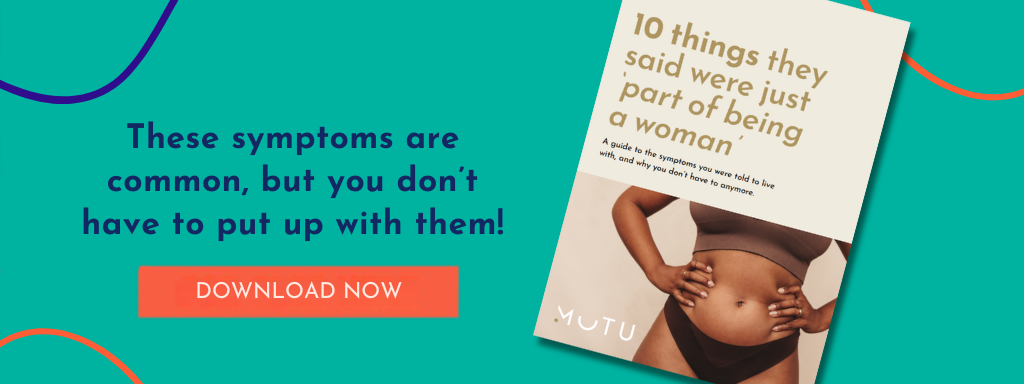Hi, Wendy here, MUTU CEO. It’s been a crazy few months at MUTU and I figured it was time for an update!
In March, MUTU was chosen by the NHS for one of the key 2021 [NIA] National Innovation Accelerator Fellowship awards. The committee, led by Prof Stephen Powis, NHS Medical Director, chose us with a view to scaling MUTU as an intervention and improving physical and mental health equity for Mums across the UK.
MUTU NHS Trial 2020
Last year, MUTU ran a trial with 100 Women’s Health Physiotherapy patients at the Norwich & Norfolk NHS Trust. The results data showed very significant improvements for patients for all pelvic health symptoms studied, as well as for mental health factors, including reduced PND and improved quality of life and confidence.
We worked with Lucy Eggleton, Lead Specialist for the Pelvic and Maternal Team, to enable patients who were unable to attend outpatient physio appointments during lockdown.
Patients were chosen to participate by the team on the basis of a moderate to severe diastasis recti diagnosis. Data on pelvic floor exercise, incontinence, prolapse symptoms, painful sex and self-confidence were also gathered. The survey data was gathered at 3, 6, 9 and 12 weeks, is anonymised, and was based on clinical surveys covering Sexual well-being, Urinary symptoms and Quality of life.
Lead Specialist for the Pelvic and Maternal Team, Lucy Eggleton: “It has been great to see that so many women have found relief from these symptoms through participating in the MUTU programme alongside physiotherapy and moving forward, this will be a programme we are happy to support and refer our patients onto… In a time of such difficulty when so many new mothers have felt isolated and unsupported, it was brilliant to be able to team up with Wendy and the MUTU System to run a clinical trial… We have been so impressed with the feedback and results, seeing women restored to full health and function.”
We all want to get these trial results published and are currently in discussions with consultants and department heads nationally to progress this.
The Postnatal Pelvic Health Care Pathway Explained
Pelvic floor symptoms are often not raised with GPs. Women feel embarrassed or ashamed or believe these conditions are ‘normal’ consequences of motherhood, believing that debilitating conditions like incontinence, prolapse or painful sex are ‘the way it is when you have babies’.
Where women do present, GPs may refer them to a specialist physiotherapist, a Urology or gynaecology consultant, or a pessary clinic.
The waiting list time for a Consultant from a GP referral, and then for the Pessary Clinic, is often a year or more (As reported by Hospital WHP). Many specialist Physiotherapy appointments now have a similar backlog and wait time, and may be carried out remotely.
Since COVID, of course, all these wait times have increased.
The very recently (April 2021) updated NICE guidelines for postnatal care state that: “…the importance of pelvic floor exercises and how to do them…” should be discussed. And that “at the 6-8 week check GP should carry out an assessment including these recommendations…”
GPs may not have the time or information to fulfil this NICE pathway directive comprehensively at the 6-week check. Postnatal GP checks are currently being carried out remotely, making this even harder.
GPs tell us they would love to be able to signpost safe and accessible, evidence-based, at-home solutions and support.
Key to the NICE directive is the ‘how to do pelvic floor exercises‘ part. Many women do not know how to perform PF exercises correctly.
Female GPs have told us that they do not know themselves.
In the NNUH trial, of the women who initially stated they did not know how to identify or exercise their pelvic floor muscles, by Week 3 of MUTU, 100% of them had learned to do so.
High-risk (of pelvic floor problems) mothers are likely to be those who have had births involving forceps, ventouse, prolonged or traumatic vaginal delivery. Immediately post birth is often too early to have meaningful discussions with new mothers about pelvic floor exercises. The focus is, of course, on acute post-birth issues and safety, and the woman will not yet be fully aware of some postnatal pelvic floor symptoms.
The Problem
This reality of women’s experience, along with our own extensive data, shows that women are not getting all the information and solutions they need when they need them.
- 1 in 3 women suffers from stress incontinence after childbirth
- 50% of postnatal women experience pelvic organ prolapse symptoms (NICE 2019)
- Urinary incontinence doubles the risk of postnatal depression (Sword; McMaster University)
Given the lack of reporting, figures are believed to be even higher.
The opportunity for non-invasive solutions to be effective is often missed.
This is where safe, accessible, non-invasive and cost-effective at-home solutions could significantly improve symptoms, as the woman waits for a specialist one-to-one consultation with a Physiotherapist or Clinic, if still needed.
Many Womens Health Physiotherapists recommend MUTU as an ideal at-home complement to Physio care.
MUTU as Intervention
MUTU solves the problem by offering transparent and credible education on ‘what’s normal and what isn’t’, how pelvic floor and core exercises should feel when performed correctly, as well as personal and expert, real-person support and advice.
Our unique and secure online community, moderated by experts, provides a space where Mums can share experiences and get evidence-based answers and guidance.
But of course, not every mum knows she can get help or can access MUTU financially… (It costs £140 for a year’s access).
We are working for national commissioning so that GPs can prescribe MUTU for women who need it.
We want Midwives, Health Visitors and Physios to have the information about MUTU, so that they can confidently signpost women where appropriate, whether whilst waiting for clinical care or, to prevent further intervention being needed at all.
What’s Next?
We are seeking a medical journal publication for wider distribution and credibility of the trial results. But most importantly, we are campaigning and working for the NHS national commissioning of MUTU.
This goal has one clear purpose to which we are passionately committed: to address the inequalities of information, care and access in maternal health.
What Can You Do?
Tell your GP, Midwife, Health Visitor or Physio about MUTU and your experience! Tell them you would have loved MUTU to have been offered or prescribed and how it would have, or has, helped you.
Make your voice heard! Talk about your experiences, about what you need, about what you wish you had known or been told. Tag us on social media @mutusystem
We will keep working tirelessly to make MUTU accessible to all mums, particularly to those who would struggle to afford to buy it, or are unable to access other specialist services due to lack of transport, child care, finances or any other challenges.
We’ll keep you posted on progress!
Are you a Medical Professional or Policy Maker who wants to help or needs more information? Please get in touch with me on LinkedIn
Let’s Do This ✊🏽












